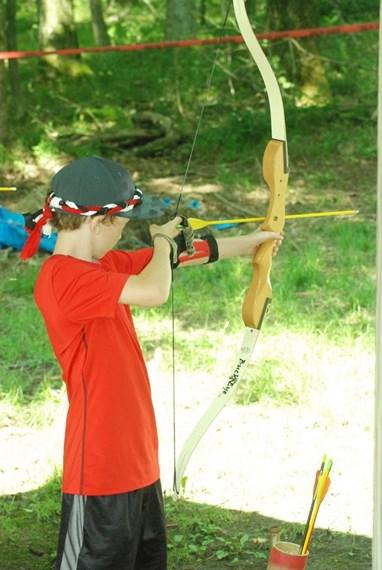
FS-1088 | May 2019
Homesickness Tips for a Successful Summer Camp Experience

“There are times when you are so filled with yearning, so desperate about being away from the people you love that you miss everything: the house that has sheltered you, your room, your pillow, your favorite dinner that your mom makes, the pet that you hug every day. You miss it so much that in that moment you think you are going to die. That’s homesickness.” (Thompson, 2012, p.63).
Homesickness is a very common occurrence at summer camp. Camp staff are trained and ready to help children so they can have a successful time. However, preparing your child for an amazing summer starts from the moment you decide to send them to camp. Here are a few tips to help parents and children prepare for homesickness as you ready for camp.
Your Child Should be Part of Camp Selection Process
Choosing a summer camp can be the hardest part of the whole summer camp experience, but the camper should be part of the decision. Start by seeking recommendations from friends or family members about their experiences with different camps. Ask your child for his/her opinions on the features different camps may offer. Feeling forced to attend camp can increase the likelihood for homesickness (Thurber and Malinowski, 2006). Research the different options and select a camp program that everyone agrees is the best fit for your child.
When selecting a camp, consider the location and cost, the quality of the programs, and the camp’s customer service during your interactions. Be sure that you and your child are comfortable with the camp choice. Once the family has decided on a camp, all conversations about the camp experience should be positive. Regularly discussing everything the camp has to offer such as activities, evening programs, and events may help your child feel excited about the summer camp.
Your Child can Practice for Camp by Spending the Night at Friends or Relatives
A child will be more likely to be homesick if camp is the first time away from home. Talking about the length of the stay at camp and discussing it in a way that makes sense to your child will also help them prepare for the opportunity. If you are sending your child to a one-week camp, compare it to the length to a family vacation or to winter break from school. Allowing your child to gain perspective about the length will help them emotionally prepare for camp.
Many parents send their children to camp to meet people and make new friends. Children’s increased use of technology may make it harder for them to develop the skills to establish relationships. Introducing themselves, making eye contact, and starting conversations are important skills needed to develop relationships.
Create opportunities prior to camp for your child to interact with other children without technology to force face-to-face contact. Library programs, youth groups, youth development programs, and day camps are great places to facilitate relationship building. You will not be with your child at camp so you may need to nudge them. Back away to allow the interaction to play out. Don’t worry if it doesn’t go well at first. Camp staff will help the start of conversations and connections so your child will be in good hands.
Approximately 95% of Children Attending Camp Feel Some Form of Homesickness, Making it a Very Normal Part of the Camp Experience
Talk to your child prior to camp about homesickness. Explain that the symptoms of homesickness include crying, stomachache, nervous butterfly feeling, feeling sad, not wanting to participate, trouble falling asleep, and acting out for attention. Give your child different strategies they can use to help work through tough times (Thurber et al., 2006).
Sample strategies:
- Bring a stuffed animal, book, or photo from home that can provide comfort
- Deep breathing techniques (for younger children telling them to “smell the flower” to breath in and “blow out the candle” to release breath works well)
- Try to keep busy so your brain is working and not worrying
- Talk with your cabin leader or counselor if you are feeling sad
- Write letters home to check in
- Check things off in camp schedule to help you focus on small goals until it’s time to return home
Many parents fear that talking about homesickness will make it worse for their child; however, research has shown that it has the opposite effect. Dr. Chris Thurber conducted research about homesickness in 1995 and found that “talking about homesickness labels the feeling, normalizes it, and puts everyone in a better place to deal with it” (Camping Magazine, 2006, p. 41).
The Bus Stop or Camp Check-in is not the Best Time to Talk Through Your Child’s Questions about Camp

Camp staff do their best to make sure that all questions are addressed in promotional materials or in the paperwork packet sent to families. Start by making sure you and your child have read all the materials provided. Make a list of your child’s concerns and things that need clarification.
Here are some common questions from most campers:
- Where do we change clothes?
- What if I don’t like the food that you have?
- What do I do if I don’t know anyone?
- Can I be in a group with my friends?
- Where do we sleep and keep our stuff?
- Can I bring my electronics?
- What happens if I get lost walking around camp?
Take advantage of open houses and orientation meetings that camps offer. There are usually opportunities to meet staff, other campers, and the camp leadership team. It is always nice to be able to ask questions in person and to meet people so there are familiar faces at camp. Encourage your child to ask their list of questions to the camp team. Not only does this get your child talking but lets them practice for asking questions at camp.
You Cannot Provide Too Much Information to the Camp about Your Child

Camp programs are developed and adapted based on what your child needs to have a successful experience. The best way to ensure this type of experience is to provide the camp as much detail as possible on requested forms. Often forms are rushed or incomplete because parents feel that if they list all the information, their child will be singled out or not be allowed to attend. In fact, the opposite is true; if you provide detailed information to the camp ahead of time, it will be easier to make sure your child never feels singled out. For example, letting the camp know your child runs to a corner and cries during thunderstorms will allow the camp staff to keep your child busy until the storm blows over or provide support and privacy in a quiet place. Other important information to include is if your child wets the bed, has food allergies, is afraid of the dark, takes medications, has never been away from home, or is experiencing a change in their life that may be stressful.
The Summer Camp Handbook (see references) provides a few tips for campers to learn to pack like a pro including: labeling everything with your name; taping a list of items packed on top of the suitcase or chest; rolling clothes and setting them upright so everything is in view when you open suitcase; and packing small items in zip lock bags to keep them together (Thurber et al., 2006).
Packing for camp should start early and be done together so it is enjoyable for everyone (Thurber et al., 2006). When packing for camp, be sure to reference the camp packing list and stick to it. Your child should be packing or assisting with packing their suitcase to help prepare them for finding items as needed and managing belongings independently at camp.
Most campers are required to bring bedding. Not every child has experience making a bed. Practice putting sheets on a bed and unrolling and rolling a sleeping bag so your child can make his/her camp space comfortable. Adhere to the items on the “do not bring” list to avoid sneaking snacks, electronics, or other items that may make your child uncomfortable about breaking rules. Start the camp experience in a positive place so it can continue on that same path.
Parents Should Provide Appropriate Support for Camp
“The first and most important thing that a parent can do is to have confidence in the child’s ability to manage the challenge of being away and to have faith in the ability to beat homesickness.” (Thompson, 2012, p. 89)

To help calm their child’s nerves about attending camp, parents may try to negotiate with them. Avoid this tactic. Contrary to popular belief, offering to pick your child up early if they doesn’t like camp is more detrimental then helpful. Providing an “out” does not allow children to give their all to the experience when staying at camp feels hard.
Successfully completing camp is the goal. Telling your child you will come get them may imply that you don’t think they will be successful at camp. Research shows that less the 1% of children leave camp because they are homesick. Kids want to stick it out and be successful at camp (Thompson, 2012).
There is a magic in summer camp that can be found nowhere else. Camp is different from school; there are no tests, evaluations, or homework. Children will experience situations in camp that allow them to build communication skills and work as a team. The separation from technology allows them to work on relationship-building skills like eye contact, introducing themselves, and face-to-face conversations.
Camp is also an opportunity for your child to write letters. If you would like your child to write you while at camp, be sure to include self-addressed stamped envelopes, pens and paper in their luggage. Please understand that letters written in the early part of camp, as children are adjusting to the routine and being away from home, can sometimes make camp sound terrible. Kids may express that they want to come home, hate everything about camp, aren’t making friends, etc. But most of the time, this is just a result of a child working through homesickness and their attitude will improve with each day.
When you respond to these letters, do so in a positive way. Encourage them to try new things, make new friends, and express excitement for this great opportunity. Feel free to check in with the camp if you are genuinely worried. Otherwise trust that the camp is doing everything needed for your child to have a safe, fun time.
Work with the camp to learn appropriate ways to communicate with your child while they are at camp. Also find out the camp’s policy on children and homesickness so that everyone understands what will happen if your child is experiencing homesickness.
Prepare Yourself as Parents for “Childsickness”
“If you believe that your job is to raise your children so they can leave you, there is only one way to know whether you have done your job: to let them go and watch from a distance as they grow into independence.” (Thompson, 2012, p. 34)
Sending a child to camp is sometimes harder on parents than on the camper. Childsickness is the parental equivalent to homesickness but you cannot add value to your child’s experience by suffering (Thompson, 2012). As a parent, focus on the value that camp can bring to a child’s life. Camp is a wonderful place and parents know that, but that doesn’t make it easy. Most kids worry about their parents and parents worry about their children. Excited campers can easily turn unhappy if they sense their parents’ nerves or hesitation. Children look to their parents for guidance on how they should feel, especially when it comes to new challenges (Thurber et al., 2006).
Make sure you have your game face on at drop off, camp visit days, and when they return. Avoid saying things like “I don’t know what I am going to do without you,” or “I am sure everything will be great, we are just sad to see you go” (Thurber et al., 2006). Remind yourself of the gift you are giving your child by letting them have time away from you to find their own way and develop their independence. While your child is away, do things to keep yourself busy, find other parents to connect with, write your child letters, and take the opportunity to relax and take care of yourself (Thurber et al., 2006).
Celebrate the Success of the Summer Camping Experience
Summer camp, regardless of the length, is a success for both parents and children. The value of working through homesickness on any level sets a child up for more successes in their future. Parents need to recognize and help their children understand how much they got out of this experience.
When your child returns from camp, you may have many different reactions. Your child may be excited to see you and happy to be home. Your child may have had a blast but would never admit it. You may see tears of joy to be home or tears of sadness that camp is over. All of these are very normal reactions. Your child may share stories, songs, and cheers which speaks to the value of their time at camp.
If your child speaks negatively of camp because they experienced homesickness, ask questions that allow your child to see how brave they were and how positive it is that they hung in there. Questions like, “What did the camp counselors do when you were sad?,” “What were you able to do to make yourself stop crying and play four square?,” “What was your favorite thing about camp?,” and “Tell me about your new friends,” are great ways to start conversations about positive parts of camp as well as what your child did cope with homesickness.
Avoid responses that don’t allow for processing such as “You made it through and you never have to go back again,” or “I’m sorry it was so terrible but at least it is over now.” As with any new experiences, some parts of camp may have been difficult for your child, but most likely there also were many positive moments. Try to work through the tough parts so you can hear about the positive experiences.
In most cases, even children that suffer from homesickness find themselves wanting to return to camp the next year. Michael Thompson (2012, p.78) states that the reason is that “children want to be independent, and they realize that they cannot be truly independent until they beat homesickness, even when they have a painful case of it.”
References
- Thurber, C. Malinowski, J. (2006). The Summer Camp Handbook. Glendale, CA: Perspective Publishing, Inc.
- Thompson, M. (2012). Homesick and Happy, How Time Away from Parents Can Help a Child Grow. New York, NY: Ballantine Books.
- Thurber, C. (2006, May). Essentials of Homesickness Prevention, Camping Magazine. American Camp Association, May/June, pp. 40-42.
AMANDA WAHLE
awahle@umd.edu
This publication, Tips for a Successful Summer Camp Experience (FS-1088) is a part of a collection produced by the University of Maryland Extension within the College of Agriculture and Natural Resources.
The information presented has met UME peer-review standards, including internal and external technical review. For help accessing this or any UME publication contact: itaccessibility@umd.edu
For more information on this and other topics, visit the University of Maryland Extension website at extension.umd.edu
University programs, activities, and facilities are available to all without regard to race, color, sex, gender identity or expression, sexual orientation, marital status, age, national origin, political affiliation, physical or mental disability, religion, protected veteran status, genetic information, personal appearance, or any other legally protected class.